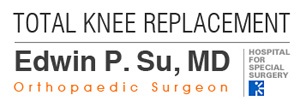Dr. Su has been researching methods to improve and enhance the recovery from TKR ever since his training was completed in 2003. As patients typically experience pain and swelling after TKR surgery, Dr. Su has been investigating ways to diminish these sensations so that recovery can be more rapid. This includes: pre-emptive analgesia, performed by the anesthesiologist prior to surgery. This means that, in anticipation of postoperative pain, the nerves supplying the knee are blocked with local anesthetic before the incision is carried out. Medications such as an anti-inflammatory medication are also given prior to surgery to aid in this goal.
The surgical technique for TKR is also carried out in a less invasive way than traditional knee replacement was performed 10 to 15 years ago. Rather than the long, 12-inch incision that was performed, a smaller incision usually measuring about 5-6 inches can now be made. The extensor mechanism (made up of the quadriceps tendon, patella, and patellar tendon) used to be flipped over during the surgery, placing tension on these structures and potentially leading to more pain; this is no longer done during the surgery.
Smaller instruments are used during the surgery also, to allow for it to be performed through a smaller incision. All of these modifications add up to less surgical trauma during the operation and a theoretically quicker recovery.
At the conclusion of the operation, Dr. Su also minimizes the amount of bleeding and swelling that a patient experiences. He is using combination of hemostatic agents that decrease blood loss after the operation, which reduce the blood transfusion rate postoperatively and may diminish the collection of blood in the knee. Reducing swelling may reduce post-surgical pain and improve knee range of motion.
Finally, Dr. Su has studied the benefits of a cooling and compression device on the knee after TKR surgery. The GameReady™ device, which is a portable cryopneumatic device, gently squeezes and cools the knee, and has been shown to decrease the amount of narcotic pain medication needed after TKR surgery.
Although in general, TKR surgery recovery can be difficult and painful, Dr. Su and his team are doing everything they can to promote a more rapid recovery.


